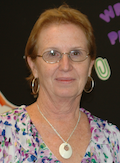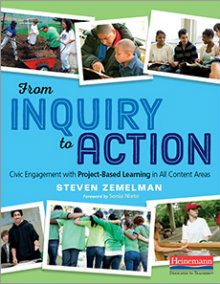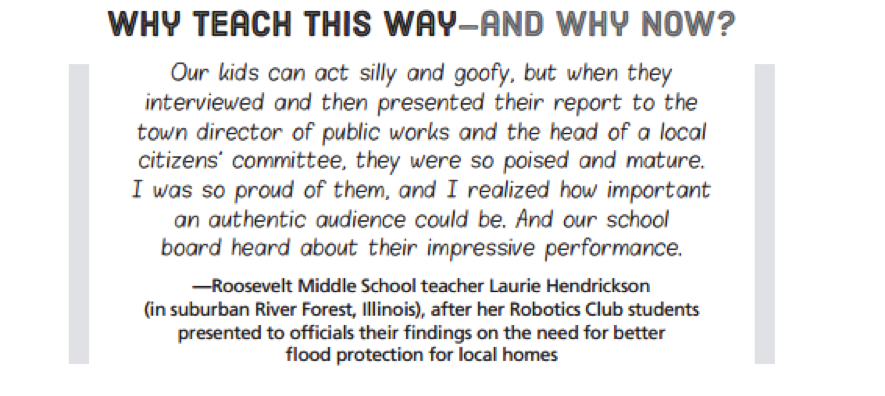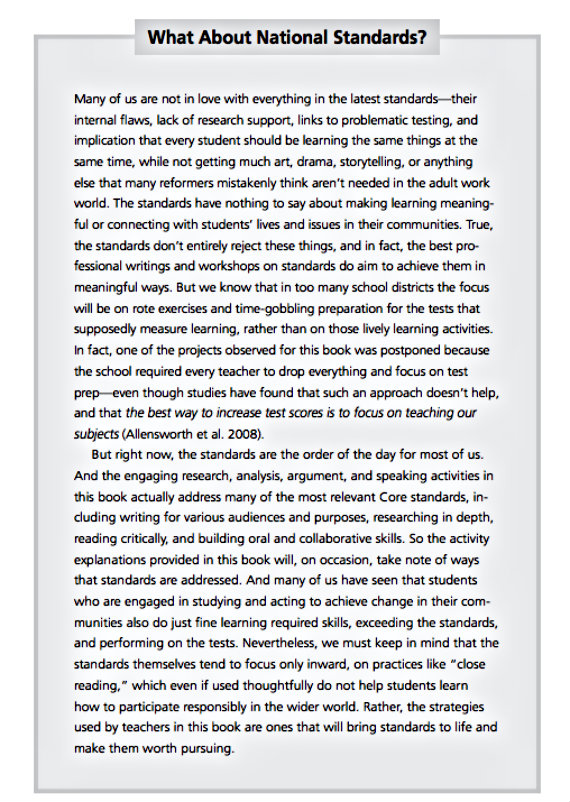Civic Engagement with Project Based Learning
From Inquiry to Action: Civic Engagement with Project-Based Learning in All Content Areas
By Steven Zemelman
(Heinemann, 2016 – Learn more)

Project-based learning. You probably have heard about it. Maybe tried it in your classroom. Perhaps promised yourself that you would learn more about it and how you could integrate it effectively into your teaching. Here’s what you need…
From Inquiry to Action: Civic Engagement with Project-Based Learning in All Content Areas is a book that can help us implement PBL, whether we have attempted it before or are somewhat new to the concept.

Admittedly, if this will be your first journey into PBL, you may find the road a bit rough. Expect a few detours and delays, as you reroute some lessons and your students reevaluate and restructure their projects. But take heart – this book will make the path easier to travel.
My own experience
Recently, I’ve been researching project-based learning and how to implement it in my classroom. This past year I was in a Professional Learning Community at my school; we learned more about PBLs and met with grade level colleagues to design a PBL activity to use while teaching our social studies unit. I am excited that I will be able to use the information that I have gleaned from this book to help redefine our current PBL.
How many schools’ mission statements read somewhat like this…”to prepare our students with 21st century skills… prepare our students to be responsible, respectful students in a global society… prepare for an ever-changing world”? As teachers and administrators, we know this is not just rhetoric but brings together critical values.
Stories of teachers facilitating civic PBL
What is special about this book is that it was inspired by teachers just like you! Zemelman observed two teachers, Elizabeth Robbins and Jean Klasovsky, Their work made him realize the importance of making education even more meaningful through social action.
Copyrighted material
Seventh grade students at Polaris Charter Academy on Chicago’s West Side are an example of the quality of the students’ questions, research, and quest to “make things right.” After the shooting at Sandy Hook and during their study of the Constitution, the students worked to prepare a plan with resources and activities to make positive changes in their neighborhood.
Students met with their alderman, then joined and worked to promote a “Day of Peace” in their neighborhood through interviewing, writing public service videos, and publishing a book of community activists. They became the Peacekeepers of Chicago. And guess what! They simultaneously covered the Common Core State Standards as well.
Copyrighted material
Understanding the setbacks, the pushbacks, and the accomplishments
I love the way the book is written. It is like watching a game on wide screen television with the announcer giving you a professional play-by-play commentary about what is happening on the field. As you read each of the engaging stories, you gain an insight into classrooms across the United States.
Just like there can be a fumble in football and you have to regroup to win, there are many fumbles in the shared PBL stories. A narrative timeline helps the reader understand the setbacks, the pushbacks, and the accomplishments. The featured teachers are generous with sharing their strategies and true stories, especially how to deal with disappointment. It is encouraging to read how they were able to reroute the students and not have the “journey” end in a roadblock.
Blending civic engagement with Project Based Learning is going to take some changing of mindsets. The teacher needs to step back and not try to be the fixer or problem solver. In fact, the teacher becomes the coach, facilitator, and co-learner as students engage in projects that address real world issues. Sometimes it’s also going to involve changing the mindsets of others: administration, colleagues, parents.
Teacher mindsets matter
Interspersed throughout the book are ideas to circumvent possible problems, but the last chapter, “Promoting Change in Schools,” is a treasure. The author acknowledges that “change in organizations like schools…is usually a complex process. Many people, teachers included, are easily threatened by something new, especially if they think it implies that somehow they weren’t already doing their best. And there are the comments and questions…What if the kids don’t do the work and just fool around? What if I don’t cover all the standards and end up with a low evaluation? Is this too political?”(p. 157, 158)
Zemelman offers common sense advice such as sitting down one-to-one with a teacher, colleague, and administrator (accompanied by coffee or chocolate) and building a relationship with them. Don’t start out defending your project but build a rapport. Find out what their interests, concerned issues and goals are. Rely on data and show examples that demonstrate that the Common Core Standards are being met. It’s all common sense advice that works!
Civic engagement is important today
I strongly feel that this book needs to be part of our students’ learning, and the sooner the better. Although the stories and strategies are mainly from fifth grade to high school, with a little bit of adaptation it can be easily used in the earlier elementary grades.
This book will help teachers prepare our students for the 21st Century world and become global, responsible, respectful students. The stories demonstrate that this marriage of PBL and civic engagement is possible; the research and the data can help convince others that students can do this work. Achieve great things! Your students are ready!
Linda Biondi is a fourth grade teacher at Sharon Elementary School in Robbinsville, NJ and a long-time Morning Meeting practitioner. She’s also the recipient of several educational grants, a Teacher Consultant with the National Writing Project, and a participant on the NJ Department of Education Teacher Advisory Panel and with ECET2 Celebrate Teaching.




































